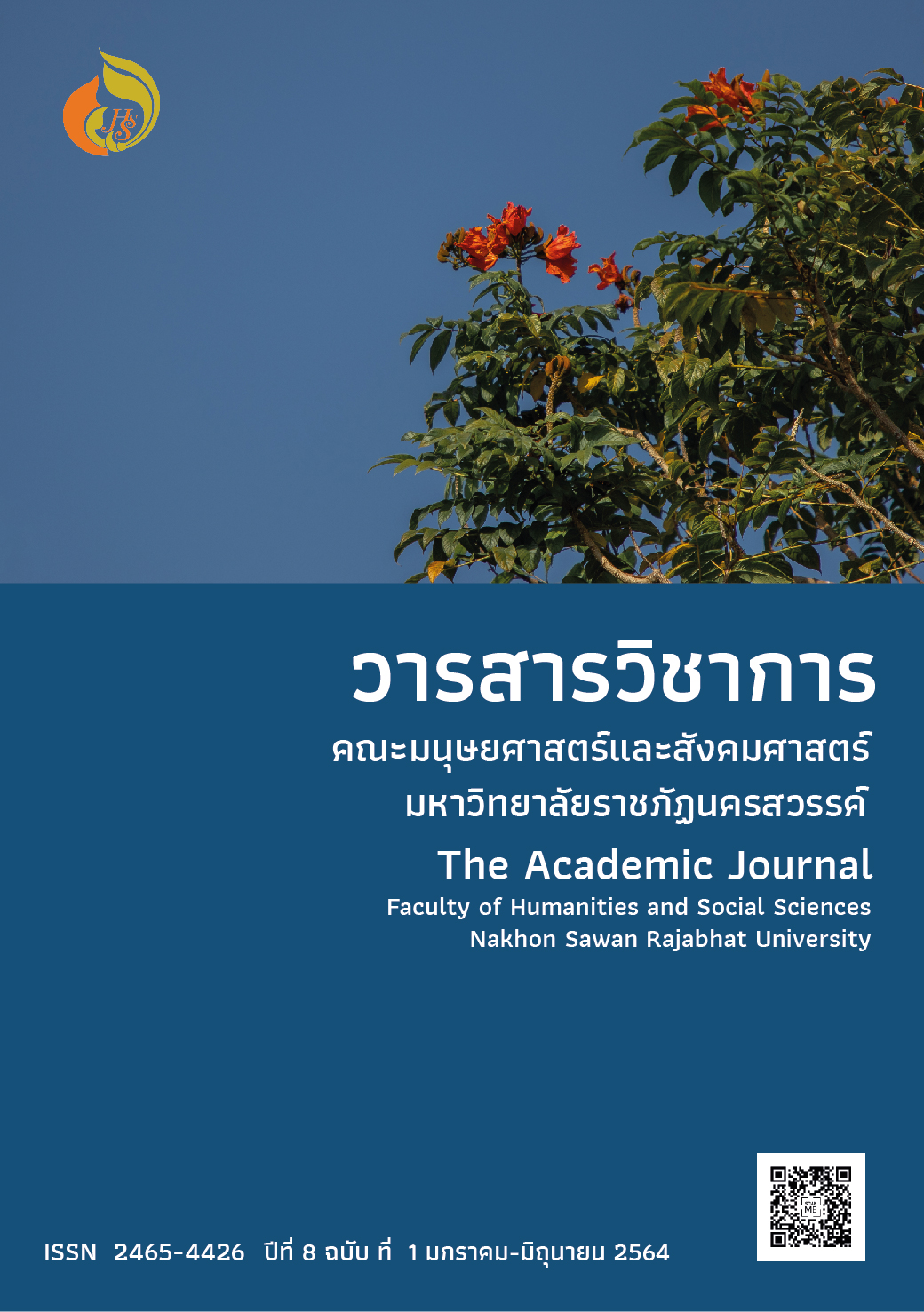The Ecological Concept in the Literature of “By The Bank Of Brokenhearted River” By Pibulsak Lakonpol
Main Article Content
Abstract
This research aims to analyze an ecological concept in the literature of “By The Bank Of Brokenhearted River” written by Pibulsak Lakonpol, a Thai national artist in the literature area in 2017. The “By The Bank Of Brokenhearted River” literature was awarded to the honorable mention literature in 2013 by the Green Globe Institute, PTT Public Company Limited. It was also regarded as the best short literature in 2018, which was published in the period of King Rama IX, related to the concept of the King Bhumibol’s philosophy awarded by the Office of Literature and History, the Fine Arts and Department, the Ministry of Culture. This research was analysed by using the concepts reflected from the content provided in the literature, the concepts apart from the content in literature, the author's biography, and the concepts of literary criticism. It can be concluded that “By The Bank Of Brokenhearted River” contains two important ecological concepts, namely the world view concept and conservation, and the development concept. The first ecological concept can be classified into three levels which are the individual view of (i) natural living and non-living things and (ii) objects, the social and cultural view, and the supra-mundane view including the belief in ghosts, samsara, and spirituality of everything.
Article Details

This work is licensed under a Creative Commons Attribution-NonCommercial-NoDerivatives 4.0 International License.
References
กรมส่งเสริมวัฒนธรรม กระทรวงวัฒนธรรม. (2561). ศิลปินแห่งชาติพุทธศักราช 2560. กรุงเทพฯ: โรงพิมพ์องค์การสงเคราะห์ทหารผ่านศึก.
โกมาตร จึงเสถียรทรัพย์. (2559). จิตวิญญาณ ศาสนาและความเป็นมนุษย์: ข้อคิดและมุมมองทางปรัชญา วิทยาศาสตร์ และมานุษยวิทยา (รายงานการวิจัย). กรุงเทพฯ: สำนักวิจัยสังคมและสุขภาพ.
ดวงมน จิตร์จำนงค์. (2556). วรรณคดีวิจารณ์เบื้องต้น. กรุงเทพฯ: ประพันธ์สาส์นจำกัด.
ดารินทร์ ประดิษฐทัศนีย์. (2553). จิตวิญญาณและนิเวศวิถี ความหลากหลายในตัวบทวรรณกรรมของ เฮนรี เดวิด ธอโร แกรี สไนเดอร์ และบาร์บารา คิงโซลเวอร์. วารสารอักษรศาสตร์. 39(2), 255-305.
ดารินทร์ ประดิษฐทัศนีย์. (2559). พินิจปัญหาสิ่งแวดล้อมผ่านมุมมองวรรณกรรมอเมริกันร่วมสมัย. กรุงเทพฯ: จุฬาลงกรณ์มหาวิทยาลัย.
ธัญญา สังขพันธานนท์. (2553). วรรณกรรมวิจารณ์เชิงนิเวศ: วาทกรรมธรรมชาติและสิ่งแวดล้อมใน วรรณกรรมไทย (วิทยานิพนธ์ปริญญาดุษฎีบัณฑิต). พิษณุโลก: มหาวิทยาลัยนเรศวร.
ธัญญา สังขพันธานนท์. (2556). วรรณคดีสีเขียวกระบวนทัศน์และวาทกรรมธรรมชาติในวรรณคดีไทย. ปทุมธานี: นาคร.
บุญยงค์ เกศเทศ. (2561). ความเชื่อเรื่องผีในอุษาคเนย์. พลังเปลี่ยนโลก. กรุงเทพฯ: อมรินทร์พริ้นติ้งแอนด์พับลิชชิ่งจำกัด (มหาชน).
ประเวศ วะสี. (2547). ธรรมชาติของสรรพสิ่ง: การเข้าถึงความจริงทั้งหมด. กรุงเทพฯ: มูลนิธิสดศรี– สฤษดิ์วงศ์.
ประเวศ วะสี. (2552). จิตวิญญาณในสังคมไทย. จดหมายข่าวชุมชนคนรักสุขภาพฉบับสร้างสุข. 6(97).
ปรียาภรณ์ มาสาซ้าย. (2546). วิเคราะห์เรื่องสั้นของวัธนา บุญยัง (วิทยานิพนธ์ปริญญามหาบัณฑิต). มหาสารคาม: มหาวิทยาลัยมหาสารคาม.
พระครูปลัดพิเชษฐ์ อคคธมโม. (2560). สังสารวัฏในพระพุทธศาสนา: ความสัมพันธ์และการตัดวงจร. (วิทยานิพนธ์ปริญญาดุษฎีบัณฑิต). กรุงเทพฯ: มหาวิทยาลัยจุฬาลงกรณราชวิทยาลัย.
พระพรหมคุณาภรณ์. (2559). พจนานุกรมพุทธศาสตร์ ฉบับประมวลธรรม. พิมพ์ครั้งที่ 34. มปท: มูลนิธิการศึกษาเพื่อสันติภาพ พระธรรมปิฎก (ป.อ.ปยุตฺโต).
พิบูลศักดิ์ ละครพล. (2556). ริมฝั่งแม่น้ำหัวใจสลาย. พะเยา: พเนจร.
พุทธทาสภิกขุ. (2552). คู่มือมนุษย์. กรุงเทพฯ: โรงพิมพ์ชุมนุมสหกรณ์การเกษตรแห่งประเทศไทยจำกัด.
ภูมิพลอดุลยเดช, พระบาทสมเด็จพระเจ้าอยู่หัว. (2539). พระมหาชนก. กรุงเทพฯ: อมรินทร์พริ้นติ้ง แอนด์พับลิชชิ่ง จำกัด.
ยุพยง ทัศคร และ มารศรี สอทิพย์. (2661). สำนึกนิเวศลุ่มน้ำโขงในนวนิยายสายน้ำและชายชรา: เรื่องเล่าจากคอนผีหลง. วารสารมนุษยศาสตร์และสังคมศาสตร์ มหาวิทยาลัยขอนแก่น. 35(3), 90-113.
ราชบัณฑิตยสถาน. (2556). พจนานุกรมฉบับราชบัณฑิตยสถาน พ.ศ. 2554. พิมพ์ครั้งที่ 2. กรุงเทพฯ: นานมีบุ๊คส์พับลิเคชั่นส์ จำกัด.
วรวรรธน์ ศรียาภัย จุไรรัตน์ รัตติโชติ และ ปาริชาต โปธิ. (2563). สารัตถะของวรรณกรรมนิราศพื้นถิ่นร่วมสมัย. วิวิธวรรณสารมหาวิทยาลัยราชภัฏบุรีรัมย์. 4(1), 81-115.
วิทยากร เชียงกูล. (2558). สิ่งแวดล้อม-ระบบนิเวศที่ทุกคนควรรู้. กรุงเทพฯ: แสงดาว.
สวนิต ยมาภัย. (2560). ภาษาไทยเพื่อการสื่อสาร หน่วยที่ 1-7. นนทบุรี: มหาวิทยาลัยสุโขทัยธรรมาธิราช.
สํานักงานคณะกรรมการกฤษฎีกา. พระราชบัญญัติวัฒนธรรมแห่งชาติ 2553 ราชกิจจานุเบกษา เลม 127 ตอนที่ 69ก ราชกิจจานุเบกษา 12 พฤศจิกายน 2553.
สุพัตรา สุภาพ. (2518). สังคมและวัฒนธรรมไทย: ค่านิยม ครอบครัว ศาสนา ประเพณี. กรุงเทพฯ: ไทยวัฒนาพานิช.
Jeremy Carrette and Richard King. (2005). Selling Spirituality: The Silent Takeover of Religion. New York: Routledge.
George Tyler Miller and Scott E. Spoolman. (2009). Living in the Environment Concepts, Connections, and Solutions. 16th edn. Canada: Yolanda Cossio.
Katherine Creath and Gary Schwartz. (2004). Measuring effects of music, noise, and healing energy using a seed germination bioassay. The Journal of Alternative and Complementary Medici. 10(1), 113-122.


